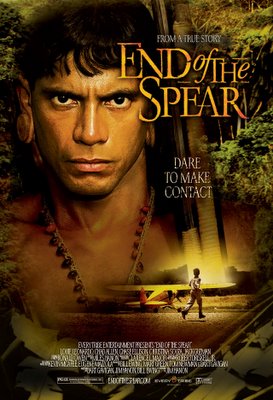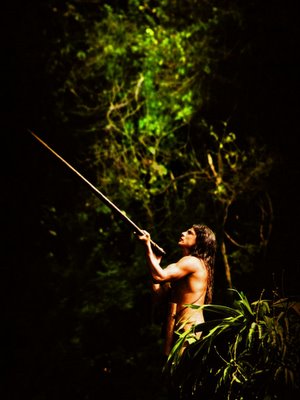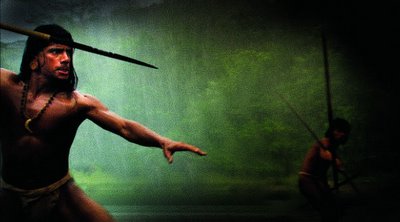
I heard about this movie on Preston and Steve. They had the son of the missionary who was killed and the Waodani tribesman who helped murder him on last week. It reminded me of the story of a Rwandan mother who forgave the killers of her son who was hacked to death with machetes.
Generally people do not understand this type of thing and the more irreligious or lacking in spiritual focus they are the more they do not understand it. Indeed, I do not understand it very well.
Those who claim to understand it enough to sit in judgment on the spiritual focus of such people seem to me to misunderstand it more than anything. For instance, the writer of the movie review that was published in the News Journal purports to understand it and judged the missionaries as guilty of "hubris" for their actions. I suppose they could make the same criticism of Martin Luther King or anyone else who chose to put themselves at risk of death based on the principles that they believed in. The ultimate example that the movie reviewer cannot understand would be Christ, given that he knew he would die and lived based on principles defined by the will of God anyway. Hubris? After all, if he had just denied "hubris" about being the son of God when he was brought in then he probably could have "lived." It's curious how those who have not even lived this life often want eternal life. But I shall not meander, few of the promo pics:




I also wanted to save a few bits of information here that I've been using to answer some Leftists on the IMDB forums, in case I ever find myself debating about missionaries again.
The stereotype of the native is drawn partly from Darwin’s belief that “weaker” races would become extinct rather than evolve and partly from the “noble savage” of the Romantic tradition. This has produced a composite image of vulnerable nobility and earth-friendly lifestyle. Ironically, this sidelines real native peoples and suppresses their struggle, their resistance and their survival. James Miller, an aboriginal author, is rightly scathing of this stereotype:(Six Modern Myths About Christianity & Western Civilization[Missionaries] were no more successful in converting Kooris to Christianity than the churches were in converting the white community. If it is said that Christianity destroyed Koori culture, then it can be said that Koori culture was not a strong culture and that Koori society in general was inferior. Such thinking depicts the Kooris to be the helpless victims of brain-washing who abandoned everything that they ever believed in as soon as someone stood up and preached from an open Bible. This was not the case and such thinking degrades Koori society. Kooris were not helpless and Koori culture was not destroyed.Miller’s opinion is repeatedly supported in missionary diaries. Take, for example, that of John Eliot, who on October 26, 1646, became the first European to preach in Algonquin. The stereotype is of native people being “brain washed,” readily abandoning their traditions and adopting new beliefs for reasons of material self-interest or cultural subservience. Eliot’s account tells of a seventy-five minute sermon, after which the Algonquin closely and perceptively questioned him for a further hour and a quarter. When Eliot left, there were many who wished to put more questions to their guest. This is not a picture of a “primitive,” passive people overwhelmed by European culture. Indeed, in comparison with the modern custom of a twenty-minute sermon, desultorily received and immediately forgotten, the Algonquin come out of it rather well. What contemporary suburban congregation would be capable of so much?
The orthodox story also stereotypes missionaries, who are cast in the dominant role and stripped of vulnerability or sensitivity before the story begins. Thus we would be unlikely to read of John Paton on Tanna burying his wife and baby son in a grave dug with his own hands, nor of his anguished cry that but for Jesus he would have “gone mad and died beside that lonely grave.” The Christian beliefs of the missionaries are, the orthodox story tells us, austere, repressed and puritanical. The more orthodox the belief, the more flint-faced and joyless. Indeed, Norman Lewis calls Christian mission an “apparatus for the repression of joy” in the naturally harmonious and joyful life of the native. This stereotype of the austere missionary was already familiar to Darwin who himself rejected it after staying with missionaries during his voyages aboard The Beagle. Indeed, any faniiliarity with the literature of biblical Christianity shows that this is a caricature.
By Philip J. Sampson :106-107)
When it comes to missionaries the culture typical to anthropologists is one of intolerance. E.g.
Although a missionary once served as president of the Royal Anthropological Institute, anthropological enculturation commonly includes categorizing missionaries as enemies. The conditioning seems to be more covert than overt, since anthropology texbooks seldom deal specifically with missionary activity and few ethnographies contain condemnations of missionaries. Two presuppositions which may influence the antimissionary attitude are (1) that the culture of a primitive society is an "organic unity" and (2) that religious beliefs are essentially meaningless. [...] It is therefore not surprising that anthropologists have a negative attitude toward those whose lives are committed to teaching people that the acceptance of specific religious beliefs is important. We should be concerned with the bases of the negative attitudes which many of us manifest, for an unwillingness to deal with them candidly will make it difficult to control for bias in field research.
(Anthropologists Versus Missionaries: The Influence of Presuppositions (Abstract)
by Claude E. Stipe
Current Anthropology, Vol. 21, No. 2. (Apr., 1980) :165-179)
I suppose you can tell by the necessity of bring up such facts that the artists who work in movies (or those who like to pretend that they do) have some of the same tendencies and attitudes as anthropologists with respect to the spiritual, or conceptual principles. For they tend to work in mere images and the imagination of their mind, sight over insight, the visible over the invisible. This would be fine if they could typically have insight about what they saw in such a way. But they do not, as that is typically not the way of the Word.
[Related posts: A Plain Parable]
No comments:
Post a Comment